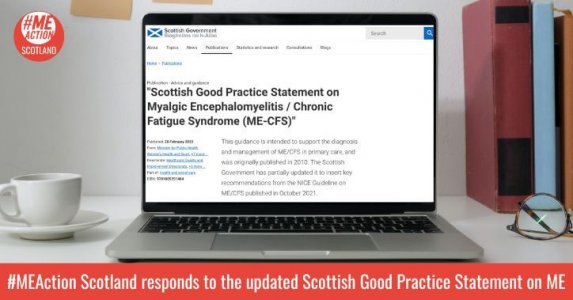The Scottish Government published the updated Scottish Good Practice Statement (SGPS) on ME-CFS on 28th February 2023.
The decision to update the Scottish Good Practice Statement, originally published in 2010, was a result of the Scottish stakeholder review of the 2021 NICE guideline on ME/CFS, and its recommendations for implementing the guideline in Scotland. The intention was to use this document as the vehicle to bring Scottish guidance in line with the NICE guideline for use by healthcare professionals, patients and carers.
#MEAction Scotland is extremely concerned about this first version of the updated guideline. Disappointingly, it is not a useful document for achieving implementation of the NICE guideline or improving healthcare education on ME in Scotland. #MEAction Scotland have written to the Scottish Government, in response to them sharing the document with Scottish ME organisations, to highlight the following key concerns:
- All of the original 2010 text, which is now outdated, has been retained. Updated guidance has only been inserted through the use of standalone text boxes. This is confusing and creates conflicting guidance, rather than clearly stating what recommendations healthcare professionals should be following.
- Not all recommendations from the NICE guideline have been included. Key sections have been excluded entirely, such as the recommendations on care and support plans. Although care plans are mentioned in the introduction of the SGPS, the relevant recommendations from NICE are not included.
- The layout is misleading and is not useful to busy healthcare professionals looking to quickly understand the relevant guidance. For example, a GP who navigates to section 3.3 on ‘Symptoms and history’ will not see the NICE recommendations on symptoms for suspecting ME/CFS. Instead, recommendations about symptoms are included in the update box in the previous section, ‘Diagnostic criteria’. There are examples of this confusion throughout the document.
- Section 4.8 on ‘Evidence levels for interventions’ includes graded exercise therapy (GET) and cognitive behavioural therapy (CBT) as interventions with the ‘strongest graded scientific support.’ It does not include an update on the NICE recommendations on GET and CBT, which are only included in section 4.5. As the Scottish stakeholder review and extensive patient feedback has demonstrated, these particular updated NICE recommendations are incredibly important to the ME community and the current presentation encourages harmful advice.
- In places, wording of the NICE recommendations has been inexplicably changed. For example, the box in section 4.4 includes a NICE recommendation with changed wording – NICE’s phrase ‘transferring from bed to chair,’ has become ‘transfers between furniture.’
- The NICE update boxes on welfare and social care in sections 7.1 and 7.2 do not contain any recommendations from NICE but provide generic sources relating to welfare benefits and social care in Scotland.
- Despite the fact that the decision was taken to include updated information outside of the scope of NICE, there is no update on other key issues, such as the updated WHO code for ME/CFS, where the previous code is referenced in the Introduction.
#MEAction Scotland feels that the new SGPS is significantly weaker, more confusing, and less safe than the NICE guideline, which was published 17 months ago. We have advised the Scottish Government that we are unable to support the updated SGPS as it stands and will not recommend it to other groups or organisations, despite being asked to support with dissemination.
The Clinical Priorities Unit of the Scottish Government has agreed to meet with us to discuss our concerns, which will take place at the end of this month. We hope to be able to work productively with the government and make a plan that will quickly and effectively implement the relevant recommendations from the NICE guideline in Scotland.






 ) and a message about #MillionsMissing with your own networks. Desktop: Download by right clicking on the image or clicking on the download icon in the bottom right corner of the image. Mobile:
) and a message about #MillionsMissing with your own networks. Desktop: Download by right clicking on the image or clicking on the download icon in the bottom right corner of the image. Mobile: